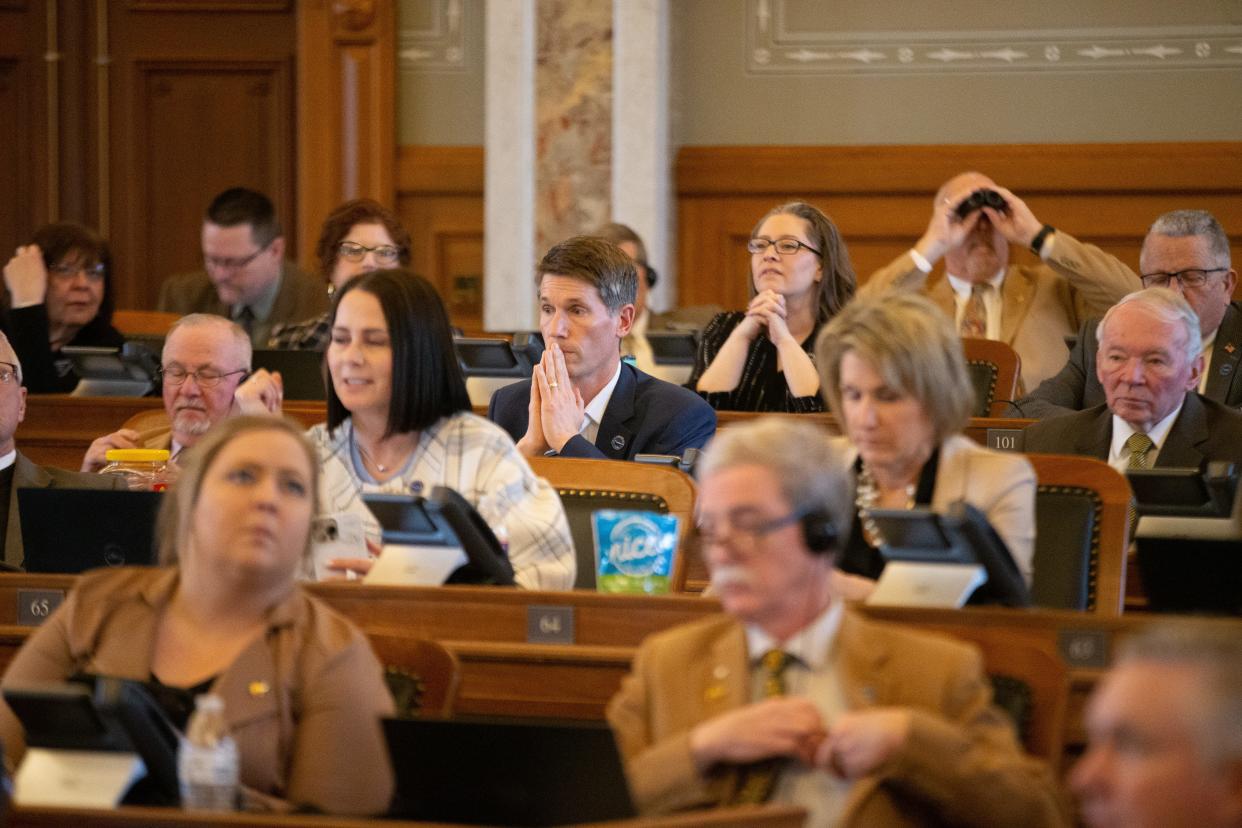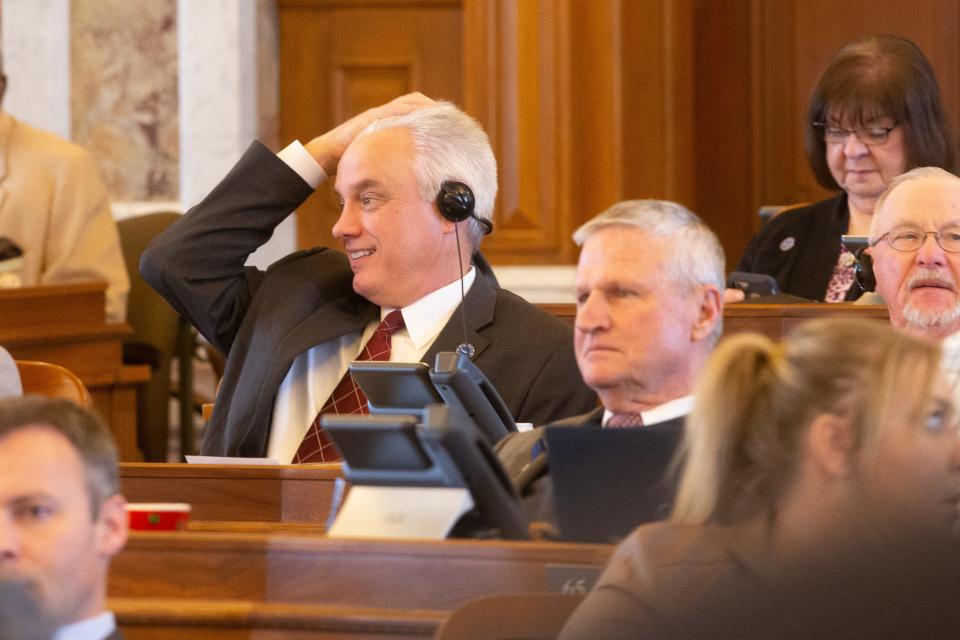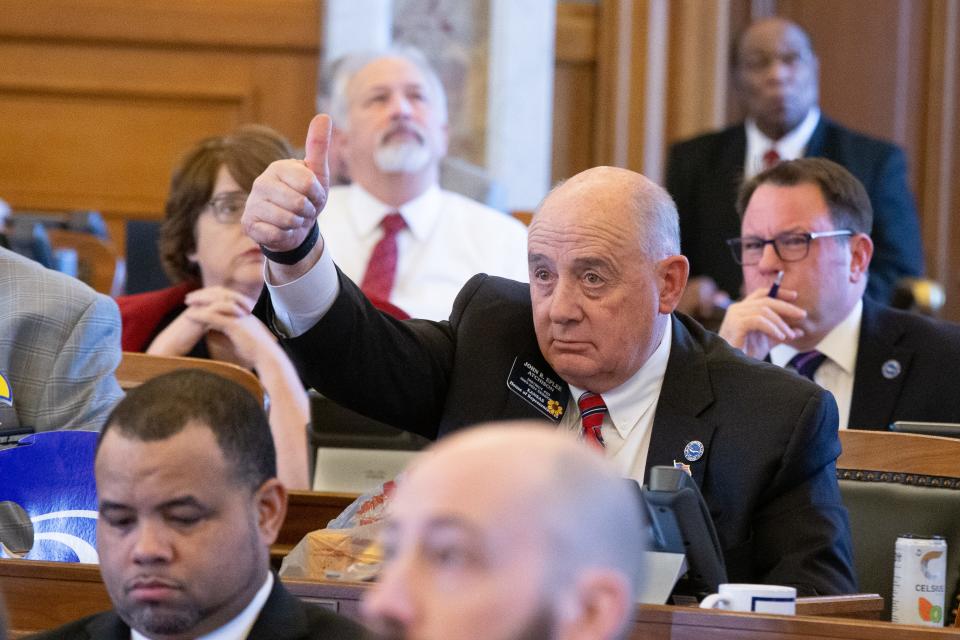After Kansas abortion vote, lawmakers advance bill requiring care for infants 'born alive'

Amid debate over abortion rights in Kansas, lawmakers approved a bill Wednesday that would require doctors to save infants born alive following an attempted abortion, despite pushback from opponents who dispute how often this occurs.
The Kansas House voted 88-34 to approve House Bill 2313, which would require that medical providers, in the event of live birth following an abortion, perform the life-saving care they would give other newborns. The vote would give lawmakers to support needed to overturn a potential veto from Gov. Laura Kelly.
Proponents argue the bill is necessary to ensure that a baby who could potentially survive an abortion will receive care.
The Kansas Department of Health and Environment does not presently keep data on babies being born alive in Kansas. Abortion providers and many medical groups insist it does not happen.
More:If you thought the abortion debate in Kansas ended with August amendment vote, think again
Jeanne Gawdun, a lobbyist for Kansans for Life, said that just because there are no documented cases of a baby being born alive in Kansas doesn't mean it doesn't happen, saying instead that it means individuals involved in the procedure are not coming forward to recount those events.
"People who are there in the room performing the abortion, the child's born alive, you're dependent on them to be able to report that," Gawdun said. "And with the absence of any type of legal penalty, what is the incentive to follow the law?"
But responding to similar legislation approved by the U.S. House of Representatives, the president of the American College of Obstetricians and Gynecologists said the effort was "not based in science or medicine."
"It is meant to incite emotions, rather than reflect the reality of evidence-based clinical care," Abbasi Hoskins said in a statement. "This legislative interference will harm families and hinder the ability of physicians to practice such evidence-based medicine."
'Born alive' abortion issue takes hold in Kansas, Congress

Currently, the anti-abortion group Family Research Council deems nine states to have "strong" born-alive protections, which generally mirror the provisions in the Kansas bill. Similar legislation was passed by the U.S. House in January and has been introduced in scores of other states in 2023.
In Kansas, HB 2313 would require that any child born during an abortion must be hospitalized immediately and said that doctors must "exercise the same degree of professional skill, care and diligence to preserve the life and health" of a child born after an attempted abortion as any other infant.
A 2002 federal law requires doctors to provide this care, but it lacks any form of criminal penalties. If a doctor violates the Kansas proposal, they could face felony charges or a civil action from the parents, though murdering an infant is presently against the law.
"I don't really see the need for this other than let's continue to shame a woman who is having to make these life decision choices," Rep. Susan Ruiz, D-Shawnee, the top Democrat on the House Health and Human Services Committee, said in an interview. "I won't be a part of it."
But Gawdun said that current laws on infanticide and child endangerment were not tailored specifically for this case.
"The penalties are very important because it's a deterrent," she said. "It's to help people who would really, who are those medical providers who say: 'I can't just stand here and, and watch this happen. I can't let this happen. I have got to do something.'"
In Kansas, most abortions are banned after 22 weeks gestation, which is before fetal viability occurs. That means any baby born before that point would not be able to survive outside the mother's womb.
A 2015 study published in the New England Journal of Medicine found that "active intervention for infants born before 22 weeks of gestation is generally not recommended," though it acknowledged the decisions are "extremely difficult."
In Minnesota, where the reporting of an infant being "born alive" is required by law, of the roughly 10,000 abortions performed in 2021, only five resulted in a born-alive infant. None of those infants survived.
Rep. Ron Bryce, R-Coffeyville, recalled a baby transported to the Texas hospital where he was conducting his residency after an abortion in the 1980s and said he found the experience profoundly affecting.
"We are moral people," Bryce said. "We believe those that are weakest among us, that are least powerful among us and most vulnerable among us should be cared for properly."

Another physician, Rep. John Eplee, R-Atchison, called the issue one of "human rights." And Rep. Bill Clifford, R-Garden City, recalled his medical school training.
While Clifford opted out of training in abortion care on moral grounds, he said "you’re still in the clinic and you're still in the vicinity and you’re in the back room and you see what ends up in a bucket or a dish."
"There's a child there," he said.
Critics argue bill could harm families, is 'political theater'
But Ruiz and others have said that the way the bill is written would crack down on providers who do not immediately spirit a baby to the hospital, rather than allowing them to die with their mother.
Democrats have also argued that the bill could cause families to incur additional medical expenses by requiring care to be provided that they believe to be unnecessary.
"The Legislature has no business making those kinds of decisions for families," Ruiz said. "We have no business putting out a bill like this."
Similar arguments from physicians and parents have been used to oppose legislation in other states. In Montana, for instance, where a ballot initiative to implement born-alive protections failed in November, there were concerns that babies born with fetal abnormalities would have to be given care that would ultimately prove unsuccessful.
Anamarie Rebori-Simmons, a spokesperson for Planned Parenthood Great Plains Votes, said the bill was "political theater at the expense of Kansans and their health and well-being" and that there is no evidence the problem actually occurs.
"This ill-informed, unnecessary legislation is meant to drive a false narrative that further shames and stigmatizes essential reproductive health care," she said. "Trusted medical providers already follow existing laws while offering the highest standards of care. This is just another instance where politicians are putting themselves directly between the patient and provider."
The bill comes months after Kansans voted decisively voted to reject a proposal that would have eroded state constitutional protections for abortion rights.
Supporters of the bill argue it does nothing to infringe on abortion rights but rather is specific to babies born alive, though Attorney General Kris Kobach's office noted in the bill's fiscal note that a challenge to the provision's constitutionality could occur if it became law.
In the House vote, Topeka Reps. Fred Patton, Jesse Borjon and Ken Corbet, all Republicans, supported the bill. All Democratic lawmakers — Reps. John Alcala, Kirk Haskins, Vic Miller, Tobias Schlingensiepen and Virgil Weigel — voted no.
But not every Democrat agreed, with five members — Reps. Jason Probst, D-Hutchinson; Cindy Neighbor, D-Shawnee; Henry Helgerson, D-Wichita; Angela Martinez, D-Wichita; and Marvin Robinson, D-Kansas City — joining all Republicans in supporting the bill.
"If a child is aborted and something goes wrong and it is alive," Martinez said, "then yes I believe the health care professional should take every opportunity to make sure that child receives care."
This article originally appeared on Topeka Capital-Journal: After amendment vote, Kansas lawmakers pass born-alive abortion bill

